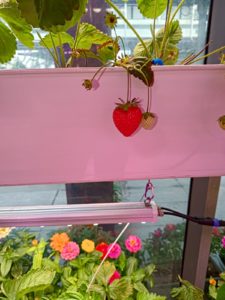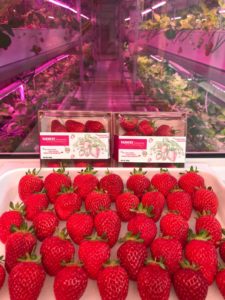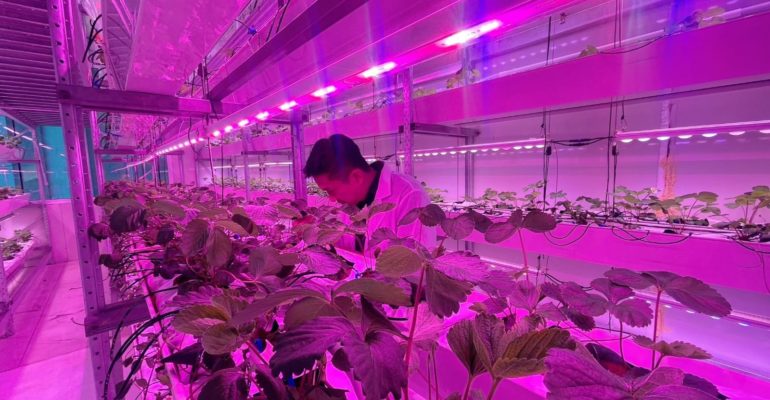Varmers, Bangkok’s Vision for Future Agriculture: A Conversation with an AVF Member
Introducing AVF member Geert Liezenga, the mind behind Varmers, a pioneering venture specializing in vertical farming, “Vertical Farmers”. Varmers has achieved a significant milestone by establishing their inaugural “proof of concept” farm in the heart of Bangkok, Thailand.
Q: How did you become a “Varmer”?
A: It started when I noticed the sky-high prices of roses in Thailand. As an entrepreneur, I started thinking about possibly growing roses indoors to address this challenge. It led me to ponder the contrast between houseplants that flourish indoors and their outdoor counterparts. This was when the idea of recreating outdoor conditions within indoor spaces took hold. Roses initially seemed like a feasible option, yet proved difficult to grow. Tulips became the next idea, yet tulip bulbs need months or weeks in cold storage before reusing. This also seemed far-fetched. Then I started reading into vertical farming, where the ideas took off. That is also when I got in touch with the AVF.
Q: Would you say curiosity can outweigh agricultural experience to embark on this path?
A: I guess so. While expertise expedites the journey, it’s not a prerequisite. We’re focused on cultivating strawberries, a field where I had zero prior experience. The first strawberry I planted inside our farm was the first strawberry plant I ever planted. This inexperience triggered fresh perspectives, though. Also, I found an amazing grower who is highly skilled at the technical part. Together with two more junior growers, they are focused on plant maintenance and growth. Everyone in vertical farming is trying to find better ways to start growing crops indoors. This means we all need to divert from standard outdoor ways.


Source: Varmers
Q: Why did you opt for Thailand as your operational base?
A: My spouse and I relocated from the Netherlands over five years ago for different work-related reasons than vertical farming. Yet, Thailand is an excellent country, perfect for vertical farming. Food issues need solving: soil degradation, airborne pollutants affecting crops, population upsurge, high chemical usage, and urban expansion demand an alternative approach to food production.
Q: Addressing Thailand’s food issues through strawberries might sound unconventional. Could you elaborate?
A: Yes, I get why that sounds weird – haha, but strawberries hold universal appeal; they’re synonymous with romance, along with champagne, chocolate, and maybe oysters. Since vertical farming is non-existent in Thailand, starting with strawberries would be a good idea to raise awareness. Yet, strawberries are among the most intricate indoor crops. Their growth encompasses plant development, foliage expansion, flowering, and fruiting. And then, when you get to that stage, you need a constant 24/7 flow of perfect red, sweet, heart-shaped strawberries. Had I known this beforehand, I might have reconsidered! (chuckles)
Q: What aspirations guide Varmers?
A: Our current achievement involves a 100m² farm with an ingenious vertical tower arrangement where we can grow over 800,000 strawberries annually. This equals a 4800m² outdoor farm that can harvest only once yearly. We cater to upscale supermarkets, restaurants, and delivery services. Furthermore, our restaurant, doubling as an “experience center”, showcases our produce. We’ve devised proprietary software and hardware for comprehensive in-farm monitoring, right down to each individual plant: at any moment, we know how many flowers, strawberries, and active plants we have, and we can immediately see when a row or area is doing less than normal. We find it very important to build that in-house (for now), because the full farm relies on understanding what is happening; installing automation systems but not knowing the right metrics is not very useful.
Our expansion phase will elevate us to scalable operations in the upcoming half-year. In this new period, we will establish a 5000m² farm partitioned into ten specialized chambers for diverse crops. Our conviction lies in the potential to cultivate nearly any crop vertically: we are now testing with multiple crops already. Our ultimate goal is to replace many traditional grocery offerings with our wholesome, pesticide-free produce.
Q: Could you shed light on your key challenges?
A: I see three things as our key challenges:
- First, it is difficult in Thailand to find specific knowledge regarding indoor farming, specifically strawberries, so we are constantly looking for people. However, Bangkok is a great place to live, and few people find it unattractive to move here.
- Secondly, it is very hard to operate a company as a foreigner. The rules state that foreigners cannot own businesses by themselves, you cannot buy land as a foreigner, and you constantly need to get visa extensions. Fortunately, the government recently acknowledged our role as “FoodTech innovators” and granted us a special certification, which solves all these issues and gives us special rights similar to Thai locals.
- Lastly, trying to find the appropriate financial partner is not easy. We have invested relatively little to get to where we are now, but we are actively searching for funding for the next few phases. Since indoor farming is new in Thailand and there is still a lot of focus on outdoor farming, it is difficult to find the right partner locally, so we switched our focus to internationally.
Q: We are happy to hear your story and excited to hear more in the future!
A: Thank you for having me. It has been an honor. Next time you visit Bangkok again, please come visit our farm!
AVF: Geert is always looking for help and new knowledge. For inquiries, jobs, or if you know Varmers’ new financial partner, contact them at info@varmers.com or visit their website varmers.com.



Comments are closed.